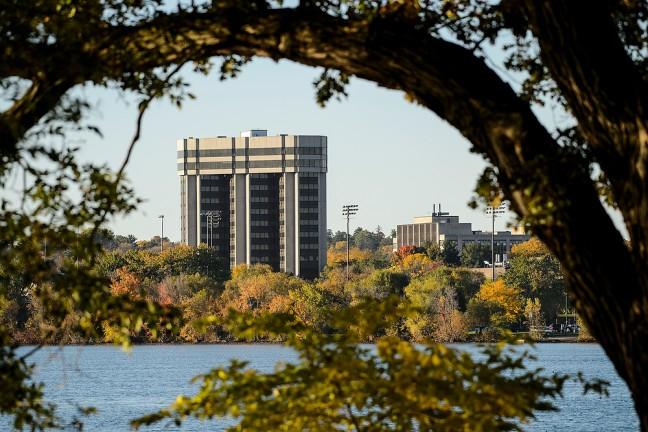The Wisconsin Alumni Research Foundation has awarded the University of Wisconsin $61.9 million for the 2017-18 school year in a ceremony last month, which went toward a range of budget items such as faculty retention and graduate student support.
Another $19 million was granted to the Morgridge Institute for Research, a private, nonprofit biomedical research institute affiliated with the university.
The $19 million grant to the Morgridge Institute for Research is the most WARF has given the institution since they began collaborating in the 2009 fiscal year, up almost $5 million from last year according to data from WARF’s website.
WARF serves as an independent, nonprofit corporation run by alumni trustees who manage the university’s patents and invest the resulting revenue to support future research. The organization has provided more than $2 billion in grants to the university since its founding in 1925.
Norman Drinkwater, University of Wisconsin associate vice chancellor for research in the biological sciences, said these funds are raised through royalties and fees.
“WARF earns royalties and fees from UW-Madison faculty, staff and student technologies that it manages, and earns returns on the investment of those resources,” Drinkwater said. “WARF distributes a portion of those earnings to faculty and departments to be used to further scientific research.”
Apple ordered to pay WARF new total of $506 million for patent infringement
WARF spokesperson Jeanan Yasiri Moe said the foundation patents discoveries that are disclosed and assigned to it, and then licenses those patents to industry. These licenses generate revenue which is partially returned to the inventor and their department, with the balance going to WARF.
From there, the foundation provides an annual grant of “tens of millions” of dollars, Yasiri Moe said.
The bulk of the funds given to UW comes in the form of a base grant. According to data from WARF’s website, the $53.3 million base grant given in 2017-18 is down by roughly $2 million from the 2016-17 amount.
But, data from WARF show the base grant has increased $18 million in just three years, going from roughly $35 million in 2014 to $53 million in 2017.
According to a guide of WARF support, a total base grant is given by the foundation’s board of trustees to the Office of the UW Vice Chancellor for Research and Graduate Education, which is then divided among nine university categories.
Accelerator trains UW computer science students in entrepreneurship
Drinkwater said the WARF board establishes the mission and objectives of grants to the university, approves the budget for grant making, reviews recommendations by the grants committee and maintains close and open communications with the chancellor, vice chancellor for research and graduate education and others.
“Funding needs are determined based not only on past practices but also on the emerging needs to enhance and increase the research portfolio of UW-Madison,” Drinkwater said.
There are many final destinations these funds could land, Drinkwater said. Data from WARF show university efforts such as faculty retention and recruitment, graduate student support, research competitions and faculty fellowships are some of the largest examples of these destinations.
In 2017, $12 million went toward faculty retention and recruitment, which are efforts to bring new professors to campus while keeping existing professors at UW.
“These funds have helped to bring talented new faculty, or keep highly productive faculty, on every part of campus,” Drinkwater said.
Additionally, roughly $11 million was raised for graduate student support, funds which are diverted to university fellowships and research programs primarily in the form of student stipends.
New tool looks to speed up research process for UW biologists
The fall research competition, which awards gap funding against pending extramural grant applications as well as pilot funding that leads to external grant applications, received more than $10 million.
More than $9 million was granted to the UW2020 WARF Discovery Initiative, which offers funding for research on campus, as well as infrastructure and equipment to support novel research directions. Drinkwater said “good results” have already been seen from earlier funded UW2020 projects.
Along with the base grant, WARF makes additional grants and special grants totaling more than $5 million.
The announcement of the $80.9 million granted to the university came alongside the announcement of the WARF Innovation Award winners.
Each year, UW faculty who disclose their research discoveries to WARF are eligible to receive an Innovation Award. Of the approximately 400 disclosures submitted this year to an independent panel of judges, only two groups of university faculty received the $10,000 honor.
Eric Schmuck, alongside Peiman Hematti, John Kink and Amish Raval, were one of the research teams receiving the award for developing therapeutic cells for tissue-specific repair.
The other team included professor of urology David Jarrard and researcher Bing Yang, who won the award for their work in predicting prostate cancer in tissue biopsies.
Schmuck, an associate scientist of cardiovascular medicine at UW, said he was humbled to receive the honor.
“UW-Madison has a tremendous track record of innovation. For our team to be considered one of the most innovative for 2017 is truly a great honor,” Schmuck said.
Schmuck and his team, however, received more than just the Innovation Award. They also received funding for future research through the UW2020 grant.
According to the university’s UW2020 web page, the monetary value of the award ranges from a $100,000 to $500,000 grant to the winning researchers, distributed over one to two years.
While most universities shoulder the costs of patenting and licensing the discoveries their university researchers bring forward, WARF covers all these costs. Its status as an independent 501(c)(3) nonprofit foundation exempts it from some federal income taxes, which allows it more flexibility in how it chooses to spend its funds.
“That translates into tens of millions of dollars each year,” Moe said. “That means WARF is saving the Wisconsin taxpayers those expenses as well.”
















